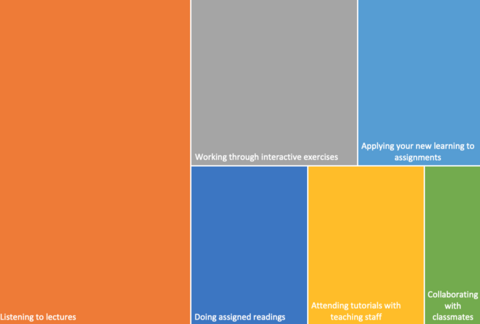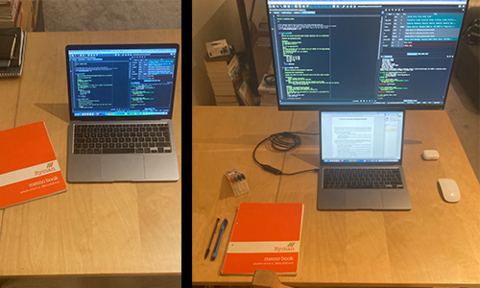
About six months ago I decided to start pursuing MSc Business Analytics (online, part-time), while continuing to work full-time. The programme started on 5 October 2020, so the past few months working full-time while studying part-time and online has been a completely new experience for me. Here’s what you can expect.
The programme structure of each of the modules has been very helpful when organising my learning goals each week. The programme is conveniently broken up into modules, of which I need to complete one per week.
Working through a module requires a variety of activities. These help to prevent the programme from feeling like an endless series of online lectures. A standard week for me generally involves spending time:
- Listening to lectures (orange)
- Doing assigned readings (dark blue)
- Working through interactive exercises (grey)
- Attending tutorials with teaching staff (yellow)
- Applying new learnings to assignments (light blue)
- Collaborating with classmates (green)
Here’s what an average week looks like for me:

Tip 1 - You’ll be spending a lot of time at your desk, so invest in a good setup
Combining work and study, I’m spending about 70 hours a week at my desk. My aching shoulders and neck soon made it clear that I needed to start investing in a better desk setup. At its minimum, this includes a monitor, mouse, and comfortable chair. Noise-cancelling headphones are also nice if you live with other people (or have neighbours doing extensive renovations).
This will differ from person to person, so find something that works for you. Personally, I prefer the simplicity of a single monitor and mouse so I can move things if needed as my desk, like for most people, is also my dining table. Also, remember that a good setup includes having an uncluttered workspace.
Here’s a little before and after visual of my workspace. While it’s still far from a slick office setup, the extra screen has been a huge help. I’m hoping to add more bells and whistles with future purchases:

2. Find a way to mentally switch over from work to study
Jumping straight from a full day of meetings into the intricacies of Linear Algebra is a recipe for frustration. I’ve found the best way to ensure a productive session at the end of the day is to create a routine. For me that has been the process of packing up my work laptop and notes, giving my workspace a quick clear (see above note on an uncluttered workspace), and whipping up dinner.
Taking that one hour to switch over has definitely helped. I experimented with a few different approaches until I found one that worked for me, so do try out a few things until you find what works.
3. Sometimes it’s okay to take the night off
Work can be unpredictable. Some days things run long, or last-minute tasks need to be dealt with. On those days, I’ve found it’s helpful to give yourself permission to order pizza and watch your favourite show that evening. While sometimes deadlines mean it’s unavoidable, generally I’ve found it’s best to just take the night off.
I’ve found that even on those tough days it’s best to try studying for at least 30 minutes. Getting started is often the hardest part, and once you’re working through say, the mechanics of depth-first versus breadth-first search algorithms, the hours will start to fly by.
It’s still early days, and I expect there will be many more learnings as I continue on my journey of studying MSc Business Analytics (online, part-time). Stay tuned!

